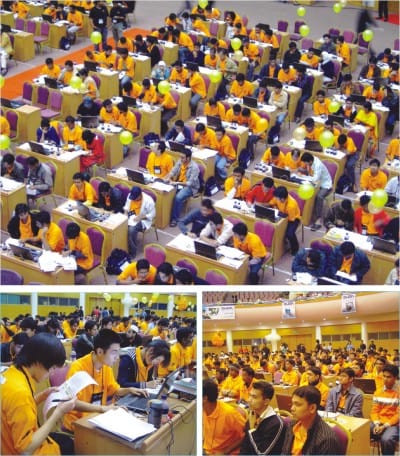Where coders battled

A bird's eye view of a portion of coders at the ACM ICPC Dhaka Regional 2007 contest, top, programmers of Fudan University of China engrossed in solving their problems, they secured the second position, bottom-left, and coders at the inaugural session.Photo: STAR
If you ask a primary-school student what they loathe most, the answer is probably exam! You may well expect the same answer from a graduate student.
Examinations are all about proving the competency of a learner. But it does not always mirror the inner qualities of a student. Our traditional education system also develops a mindset which makes the students focus more on the exams than on life as it really is.
Students then lack practical know-how that the industries mostly expect from them. In order to overcome this setback, some co-curricular activities are playing a significant role in bridging the gap between academia and industry.
Programming contest is such a thing, which opens a new horizon for the youngsters to exhibit their creativity and potential. It is a talent competition.
This year East West University (EWU) organised a prestigious programming contest, "ACM ICPC Dhaka Regional 2007", on December 8 at Bangladesh China Friendship Conference Centre (BCFCC).
The ACM ICPC (International Collegiate Programming Contest) is an IBM -sponsored global initiative to find the best coders. Bangladesh is a regular participant in this event and has an impressive track record as well.
The ICPC authorities have set some guidelines for both the contest and the contestants. A university team must come through the regional contest to qualify for the world final. Many universities arrange local contests in order to pick up contestants for the regional level.
Only university students are eligible to join this battle of coders. Each team comprises three members and needs to solve 10 given problems within five hours. Programmers can use programming languages such as C, C++ or Java to solve the problems. PC Square software is used to analyse the result. As soon as a team solves a problem, a balloon is attached to their desk.
This year EWU organised the contest after the fashion of the world final that attracted talent and showcased the nation's capability to organise such a hi-tech international event.
Chief guest of the inaugural ceremony and former chief adviser Mohammad Habibur Rahman stressed the need for information technology in order to foster the growth of modern business activities. He also put emphasis on inventing new-age technology that in effect will enlighten the nation.
Jalaluddin Ahmed, president of board of directors of EWU, urged the young learners to work rigorously so that they can become expert and transform the nation into a true knowledge-based society.
Eighty-three teams from 31 local and one Chinese universities participated in this competition. EWU also opened the door to college-level contestants and four teams from different colleges added special attraction to the talent contest. Chief judge Prof Zafar Iqbal of Shahjalal University of Science and Technology (SUST) coordinated a team of 11 judges.
'Buet Sprinter' team ranked top, followed by Fudan University of China and EWU. The Buet team solved seven problems out of 10, Fudan University solved six and EWU five.
Prof Zafar Iqbal announced the names of the winning teams. The problem set was analysed by Shahriar Manzoor, judging director of this contest. Top 18 teams were awarded prizes at the contest.
Prof Nazrul Islam, chairman of University Grants Commission (UGC), was chief guest at the award-giving ceremony and Prof Mohammad Sharif, vice chancellor of EWU, presided over the entire session. Dali Islam of IBM was present as special guest at the ceremony.
Programming contest first began here in 1992 and gained momentum in 1996. ACM ICPC Dhaka site kicked off in 1997 with the initiative of Prof AL Haque of North South University. 18 teams from 11 institutions participated in the contest that was held on November 18, 1997. Buet team 'Bengal Tigers' dominated the contest. Buet students participated in the world final in Atlanta in the US on February 28 the following year.
Buet's success increased the programming contest craze and at the same time added a new dimension to computer science education. Prof M Kaykobad of Buet was selected as one of the best coaches in the world final in 2001. Another renowned name in the country's programming contest history is Shahriar Manzoor. From 2003 on, he has been a judge in the world final.
North South University (NSU) and Buet successfully organised the previous nine ACM ICPC Dhaka site contests. NSU hosted six contests and Buet three. EWU got the nod from ACM ICPC authorities to host the next three contests from 2007 to 2009.
Apart from regular programming contests, our programmers also do better in online programming contest. The virtual display of Bangladeshi flag on Valladolid University's ACM chapter web page is a witness to our global emergence.
Until recently, all programming contests in Bangladesh were held in the closed environment of the host universities. But this year EWU broke this trend by organising the programming contest on the huge floor of BCFCC. It gave the programmers mental comfort and flexibility.
In addition, this event also showcased state-of-the-art technology supported by Global Brand to handle such mission-critical activity. Contribution of print and electronic media also helped the organisers disseminate the essence of this contest.
It's time Bangladesh shed dependence on unskilled labour. In this regard, we need to focus on software industry. We get many bright programmers through each ACM ICPC contest and it is high time we utilised their talent to ensure our strength in the global IT domain.

 For all latest news, follow The Daily Star's Google News channel.
For all latest news, follow The Daily Star's Google News channel. 



Comments